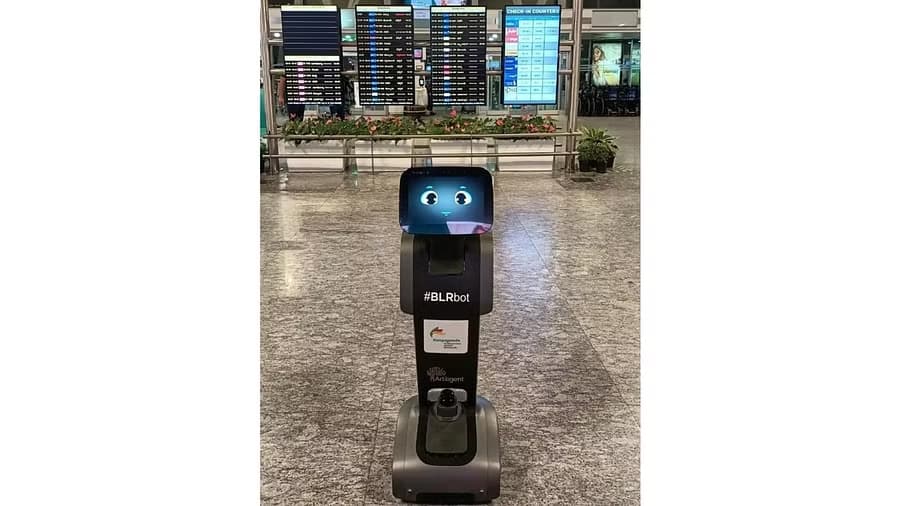


Been to the Bengaluru airport recently and saw cute bots roaming around? The Temi Robots aka Temi, called #BLRbot, are popular at the airport.
These autonomous robots have conversational skills, mapping abilities, and exceptional sensors. Artiligent Solutions, a Mumbai-based company, which extensively works in the field of robotics and conversational Artificial intelligence (AI), created Temi. The robots have been deployed at Kempegowda International Airport Bengaluru (KIAB) to assist customers with directions and other flyer information.
“Even if there is adequate signage, people prefer to check details again. Since a robot is a device with mobility, we thought of leveraging its navigation properties and adding a software that will help with these details,” elucidates Sachin Arondekar, director of Strategic Alliances at Artiligent Solutions.
The bot is packed with features. “It has quality sound due to good speakers and a subwoofer. The bot uses AI that enables recognition of conversation along with providing answers for the same, has excellent navigation, is silent on the floor, and has a low carbon footprint,” he adds.
It shows videos and captures photographs of the floor, as well as helps connect the customer/flyer to any help desk through its video-calling features. Added with great ground sensors, Temi can detect obstacles that are stationary or dynamic. “If a passenger suddenly comes in front of the robot, it will stop. It is equipped with SLAM (simultaneous localisation and mapping) technology that helps it map the entire airport. We mapped the entire space of the airport in a matter of days,” says Sachin.
Temi’s autonomous navigation can be programmed to reach a particular location at a set time. The robot’s battery can run for six to eight hours. Talking about a unique feature, Sachin says, “When the battery runs out, it finds a charging station and docks itself. The bot uses AI and machine learning for this.”
The robot weighs only 12-13 kg and can easily manoeuvre through small spaces. Having gone through multiple iterations, the company is still making changes. “In the initial stages, the SLAM technology limited the bot’s movement to a shorter distance, the new one can allow navigation up to 40 m. This is big, especially in large and public spaces like airports,” he says.
From a software perspective, when there is an obstacle in front of it, the robot must find the best way to move. “We had some trouble making the robot understand that the trolley collectors that push the trolleys back to their place are a moving obstacle. We had to tweak the software umpteen times,” he adds.
After receiving feedback from passengers, the team is working on integrating information about flights, departure times, gate numbers, and baggage belts. “This was a part of the original plan, but it was meant to come out in the next phase,” says Sachin.
It took a year for Temi to be launched at the airport. Today there are 10 Temi robots at the Bengaluru airport. With the new terminal opening soon, the team will be launching more next year. The Coimbatore airport has two such robots, which were launched in June.
Their upcoming robot, the ‘Temi Go’, is a delivery robot that can be used in restaurants and hospitals, and various service centres. “The body can be customised for specific needs. It has trays to deliver food and sensors that know if you’ve picked the food,” he adds.
The team hopes to introduce a robotic platform, where companies can get customised robots. “They would be like company mascots. Companies can use them in their stores,” he adds.
Copyright Artiligent Solutions Pvt Ltd. All Rights Reserved